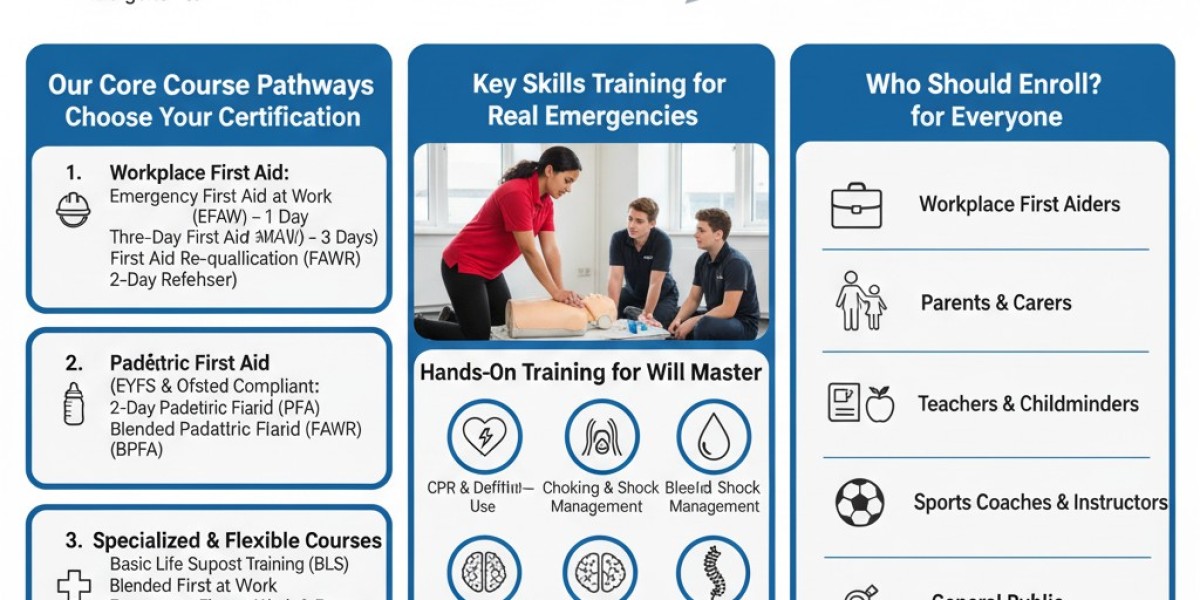Emergencies can strike at any moment — a slip, a sudden illness, a choking hazard, or someone collapsing. In the workplace, seconds matter. That’s why the Emergency First Aid at Work (EFAW) course is one of the most important trainings an employer or individual can invest in. At Practical First Aid, our EFAW course is designed not only to meet legal requirements, but to equip you with real, hands-on skills and confidence to act decisively when it counts.
What is the EFAW Course?
The EFAW (Emergency First Aid at Work) course is a one-day (6-hour) certified training programme that conforms to Health & Safety Executive (HSE) requirements. It’s aimed at providing fundamental emergency first aid skills that are relevant for low-risk workplace settings — offices, retail shops, small businesses, etc. Practical First Aid’s course gives you more than theory: you get immersive, scenario-based practice, realistic simulations, and guidance from experienced trainers.
Who Should Take EFAW?
This course is ideal for:
Employees in low-risk workplaces (e.g. offices, retail, administrative roles) who may be designated as a workplace first aider.
Small business owners, managers, supervisors who need to meet their legal and health & safety obligations.
Individuals who want to gain practical first aid skills for emergencies at home or in everyday life, not just at work.
What You’ll Learn in Our EFAW Course
By the end of the course at Practical First Aid, you will have mastered both theory and practical skills in:
Roles & Responsibilities of a First Aider – What is expected from someone designated as a first aider; incident reporting; what must be in first aid kits.
Assessing the Scene & Casualty – Conducting primary surveys, checking for safety, determining response measures.
CPR & AED Use – Cardiopulmonary resuscitation on adults; use of an Automated External Defibrillator.
Unresponsive Casualty – How to place a person in the recovery position; what to do when someone faints or is unconscious.
Managing Common Workplace Incidents – Dealing with choking, minor injuries, cuts, bleeding, burns, and shock.
Infection Control & Basic Hygiene – Ensuring both the first aider and the casualty remain safe; preventing infection.
All training is delivered with realistic simulations (mannequins, choking manikins, simulated injuries, etc.) so you practice under conditions that mimic real emergencies.
Course Format & Certification
Duration: One-day, approximately 6 hours of training (face-to-face).
Certification: On completion, participants receive a fully accredited EFAW certificate valid for three years.
Locations: Practical First Aid offers courses at their New Malden centre and also travels to workplaces across London, Brighton, Slough, and surrounding areas for group or on-site delivery.
Why Choose Practical First Aid’s EFAW Course?
Here are key advantages of undertaking the EFAW course with us:
Hands-on, scenario-based training — not just lectures. You’ll practice in lifelike situations so you’re ready to act.
Compliance and Recognition — The certification is recognised, meets HSE standards, and is valid for three years. It helps satisfy workplace legal duties.
Realistic Simulations — Using training aids like fake blood, full mannequins, AED practice, choking scenarios to build familiarity.
Flexible & Local — You can take the course at our training centre or have us come to your workplace. We cover London and surrounding areas, making it easier to arrange.
The Real Benefits to You and Your Workplace
Completing the EFAW course doesn’t just “tick a box” for compliance. The benefits are far-reaching:
Empowerment and Confidence — You or your staff will feel equipped to react swiftly and effectively in emergencies.
Reduced Severity of Injuries — Early intervention can prevent complications from wounds, shock, choking, etc.
Legal & Ethical Duty — Employers who ensure trained first aiders meet their duty of care as laid out by UK health & safety law.
Peace of Mind — For employers, employees, clients — knowing someone on site can manage emergencies until professional help arrives.
Final Thoughts: Why the EFAW Course Is a Smart Investment
Investing in an Emergency First Aid at Work Course is more than compliance — it’s a proactive safety measure. It ensures people are ready, facilities are safer, and you are better prepared for the unexpected. At Practical First Aid, our mission is to make this training accessible, practical, and valuable, so that everyone leaves not just with a certificate, but with readiness and confidence to save lives.






